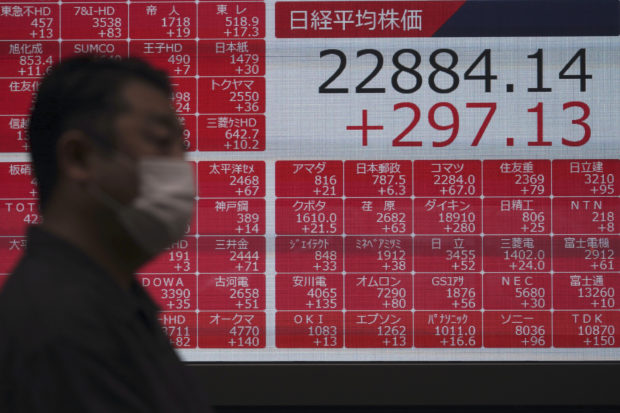Asian shares retreat as virus vaccine rally fades
Shares fell back in Asia on Thursday after markets worldwide rallied on rising hopes for a COVID-19 vaccine.

A man walks past an electronic stock board showing Japan’s Nikkei 225 index at a securities firm in Tokyo Wednesday, July 15, 2020. Shares were mostly higher in Asia on Wednesday as investors were encouraged by news that an experimental COVID-19 vaccine under development by Moderna and the U.S. National Institutes of Health revved up people’s immune systems just as desired. (AP Photo/Eugene Hoshiko)
Benchmarks fell in Tokyo, Hong Kong and Shanghai early Thursday. Investors see a vaccine as the best way for the economy and human life to get back to normal.
Researchers announced on Tuesday that one developed by the National Institutes of Health and Moderna had revved up people’s immune systems in early testing, as hoped. But that news, plus a report that China’s economy grew 3.2% in annual terms in April-June failed to sustain the rally, as rising numbers of confirmed coronavirus cases clouded the outlook.
Tokyo’s Nikkei 225 lost 0.5% to 22,825.55, while the Hang Seng in Hong Kong fell 1.1% to 25,207.82. In South Korea, the Kospi shed 0.6% to 2,190.66. The Shanghai Composite index skidded 1.4% to 3,315.11.
In Australia, the S&P/ASX 200 edged less than 0.1% lower, to 6,051.90, as authorities reported that Victoria state had confirmed a record 317 new coronavirus cases in a day.
The Victoria government responded be reducing numbers of non-urgent surgeries allowed in hospitals to increase beds available for COVID-19 patients, Health Minister Jenny Mikakos said.
Article continues after this advertisementChina reported, meanwhile, that its economy grew at a 3.2% pace in April-June from a year earlier, rebounding from a painful 6.8% contraction in the previous quarter that was its worst performance since at least the mid-1960s.
Article continues after this advertisementThe expansion came as anti-virus lockdowns were lifted and factories and stores reopened. But it still was the weakest positive figure since China started reporting quarterly growth in the early 1990s.
Boosting factory output is the easy part, said Stephen Innes of AxiCorp.
“No matter how much stimulus and fiscal sugar you try to entice consumers with, they will not leave their apartment and go on a spending spree until they feel confident the landscape is virus-free,” he said in a report.
Overnight, the S&P 500 rose 0.9% to 3,226.56, pulling to within 4.7% of its all-time high set in February.
The Dow Jones Industrial Average also climbed 0.9%, to 26,870.10, and the Nasdaq composite gained 0.6%, to 10,550.49.
Several things helped lift the market, including stronger-than-expected reports on the economy and on corporate profits from Goldman Sachs and others. But the vaccine hopes were at the center of the rise, which meant the market’s leaderboard was dominated by companies that would benefit most from a return to normal life. They included cruise-ship operators, airlines, retailers and hotel chains.
Stocks of smaller companies also leaped much more than the rest of the market, an indication of rising expectations for the economy.
The Russell 2000 index of small-cap stocks jumped 3.5%, a turnaround from earlier months when big, tech-oriented companies were carrying the market.
Winners of the stay-at-home economy created by quarantines and lockdowns, meanwhile, lagged behind. Clorox, Netflix and Amazon all fell.
Rising numbers of infections and deaths from the COVID-19 pandemic remain a constant source of uncertainty.
Worries also remain high that the stock market has gone overboard in its rally: It has taken less than four months for the S&P 500 to almost return to its record after being down nearly 34%. But it could take years for the economy and corporate profits to get back to where they were before the pandemic struck.
A raft of troubling news, from the more than 13.5 million confirmed cases of COVID-19 to escalating friction between Washington and Beijing, hangs over the markets but has been countered by the massive amounts of stimulus poured into financial systems by central banks to counter the pandemic downturn.
“In most other realities, this would be ironic or absurd. But in the liquidity inundated post-COVID world/markets, this is Thursday,” Mizuho Bank’s Riki Ogawa said in a commentary.
The yield on the 10-year Treasury slipped to 0.62% from 0.63% late Wednesday. It tends to move with investors’ expectations for the economy and inflation.
In other trading, benchmark U.S. crude oil shed 13 cents to $41.07 per barrel in electronic trading on the New York Mercantile Exchange. It rose 91 cents to settle at $41.20 per barrel on Wednesday.
Brent oil, the international standard, gave up 8 cents to $43.71 per barrel. It picked up 89 cents to settle at $43.79 per barrel overnight.
The dollar bought 106.94 Japanese yen, down from 106.96 yen late Wednesday. The euro was trading at $1.1408, weakening from $1.1411.